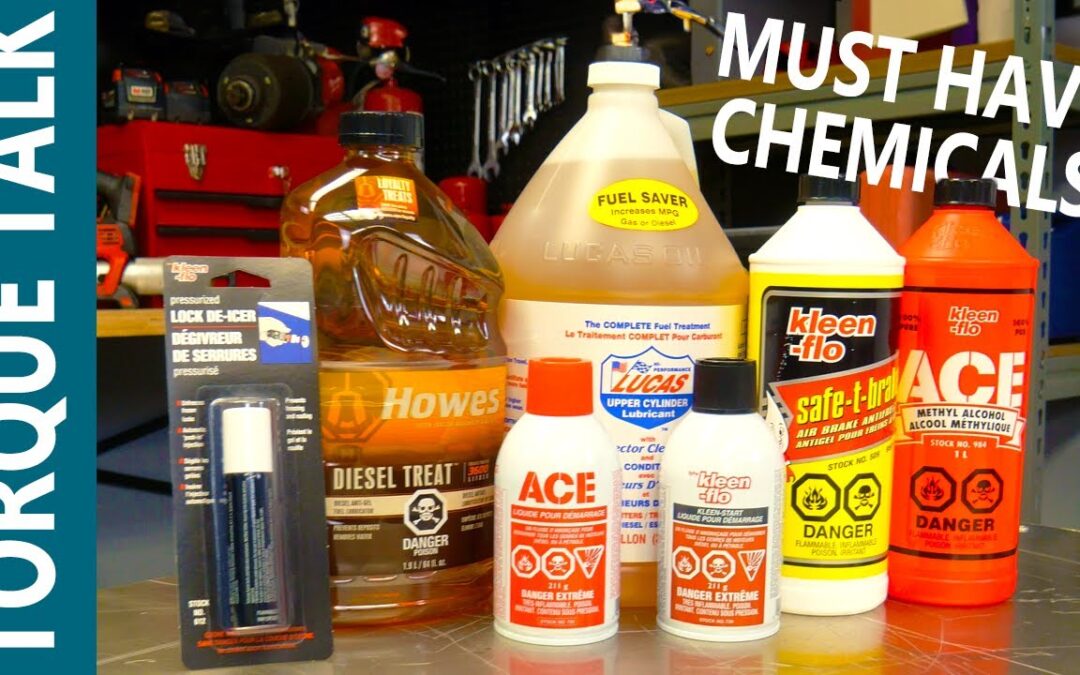Did you know an ice crystal the size of a pin head can cause a leak large enough to drain the air from a service reservoir in less than 10 minutes? Stick around and find out how you can avoid that major headache for only a few dollars.
As winter settles in, the chilly temperatures not only affect us but also take a toll on our trucks. During these cold months, it’s more important than ever to equip your truck with the right chemicals to keep you moving. Today, we’re highlighting the top five chemicals that are essential for winter truck maintenance. Let’s dive in.
First, diesel treatment, products like Howes or Lucas Fuel treatment stand out as one of winters most important must-haves. These treatments are vital for maintaining the quality of diesel in your truck during the cold months. Diesel contains paraffin, a combustible component that adds power but tends to thicken or gel in low temperatures. Diesel treatments, like Howes, include anti-gelling agents that prevent paraffin from thickening. Moreover, they boast water-demulsifying agents, removing any water in the fuel before it freezes. These conditioners also provide additional benefits such as lubrication, detergents, and other chemicals that contribute to a cleaner and more efficient combustion process.
It’s worth noting that different diesel treatments may target specific aspects, so the choice of a particular product depends on the desired benefits and the operating conditions of the vehicle.
Another essential chemical for winter is Methyl Hydrate. When the cold weather strikes, make sure you have Methyl Hydrate on your truck. Its primary purpose is to prevent gas lines or valves from freezing by eliminating moisture in your system. This chemical is effective because it absorbs water and, due to its properties, lowers the freezing point of the water/Methyl Hydrate mix. This allows it to flow through your system and combust in the engine, as it is a flammable substance.
Remember that empty reservoir? You can avoid those issues with air brake anti-freeze. It is a specialized fluid designed to prevent moisture within air brake systems from freezing, particularly in colder climates. In cold temperatures, moisture can accumulate in these systems, leading to potential brake malfunctions. Air brake anti-freeze is formulated to lower the freezing point of any water present, ensuring the continued proper functioning of air brake components, even in cold weather.
In the dead of winter, when temperatures plummet and locks freeze, lock de-icer becomes a valuable ally. This specialized product is designed to thaw and prevent the freezing of locks, providing a quick solution to a common cold-weather problem. Lock de-icers come in various forms, including aerosol sprays and liquid solutions. They not only melt ice but also leave an anti-freeze residue in the lock, preventing future freezing. Additionally, they lubricate the lock with agents included in the product.
Lastly, consider keeping starter fluid on hand. This highly flammable spray gives your engine the extra kick it needs to start in cold weather by altering the fuel/air mixture to create a more conducive environment for combustion. However, exercise caution when using starter fluid, as excessive or improper use can lead to engine damage or safety risks. Modern engines, especially those with electronic fuel injection systems, may not require or benefit from starter fluid, so consult your vehicle’s manual for specific recommendations. Always use starting fluid with care and in accordance with safety guidelines.
These are the 5 must-have chemicals you need for your truck this winter. From diesel treatments that preserve fuel quality and prevent freezing to Methyl Hydrate ensuring gas lines remain unfrozen, each chemical serves a crucial role. By incorporating these top-tier chemicals into your winter truck operations, you’ll not only boost performance but also ensure safety and reliability during the coldest months of the year.




